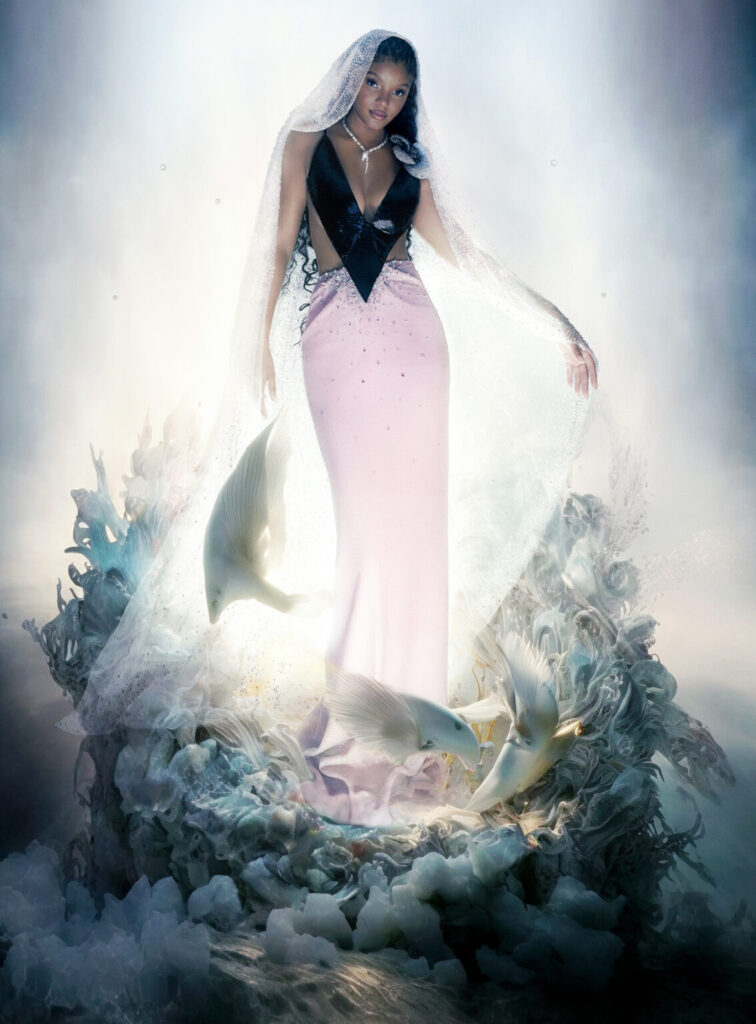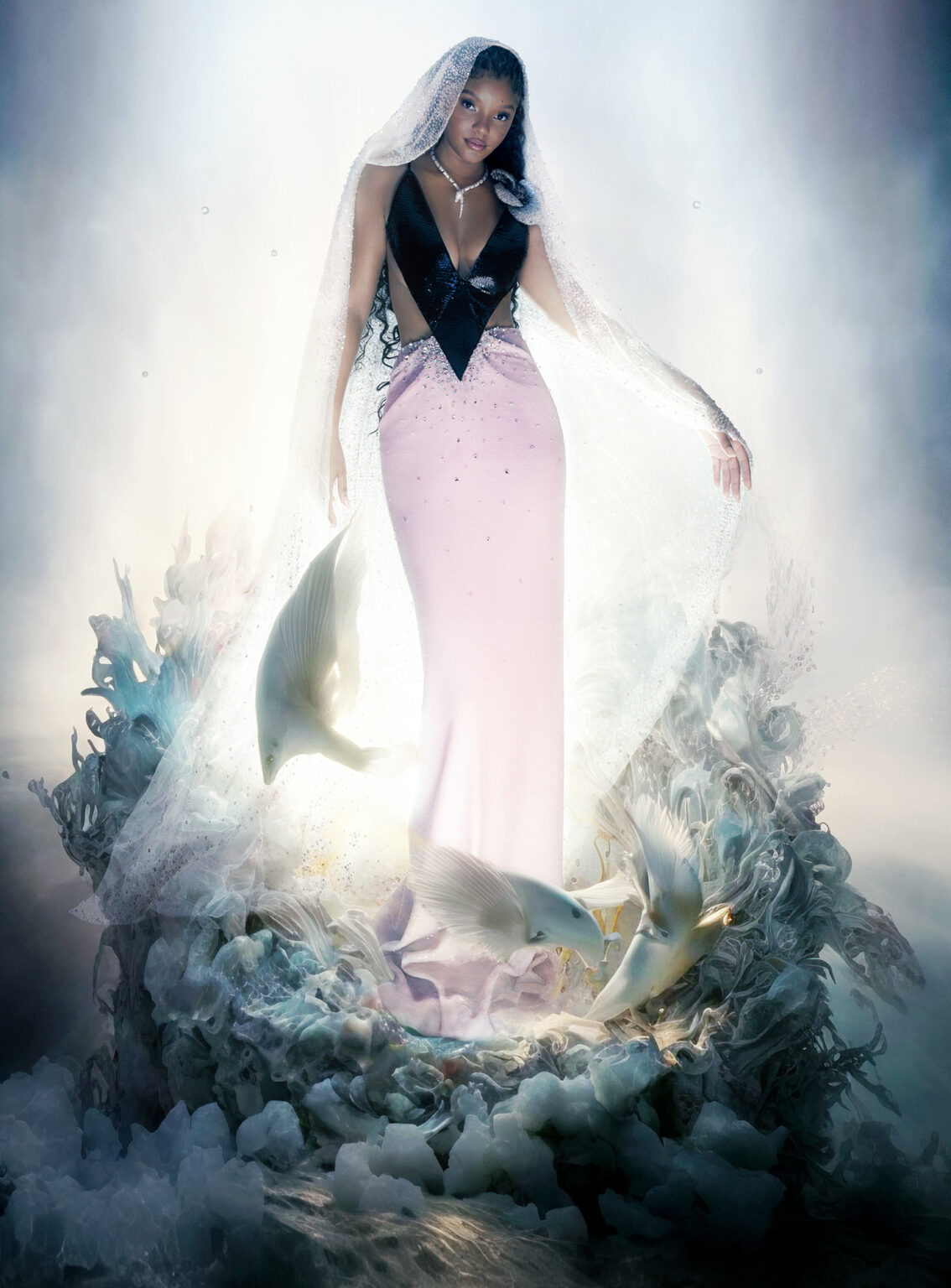This story appears in our V142 Summer 2023 Issue, now available for purchase!
When director Rob Marshall announced his casting of Halle Bailey as Ariel in his live-action remake of The Little Mermaid, the news made waves. How could it not? The 23-year-old singer, famous as one half of the musical duo Chloe x Halle, did not have an extensive acting repertoire, nor did she identically resemble the original cartoon Ariel—perhaps one of the most beloved children’s characters of all time.
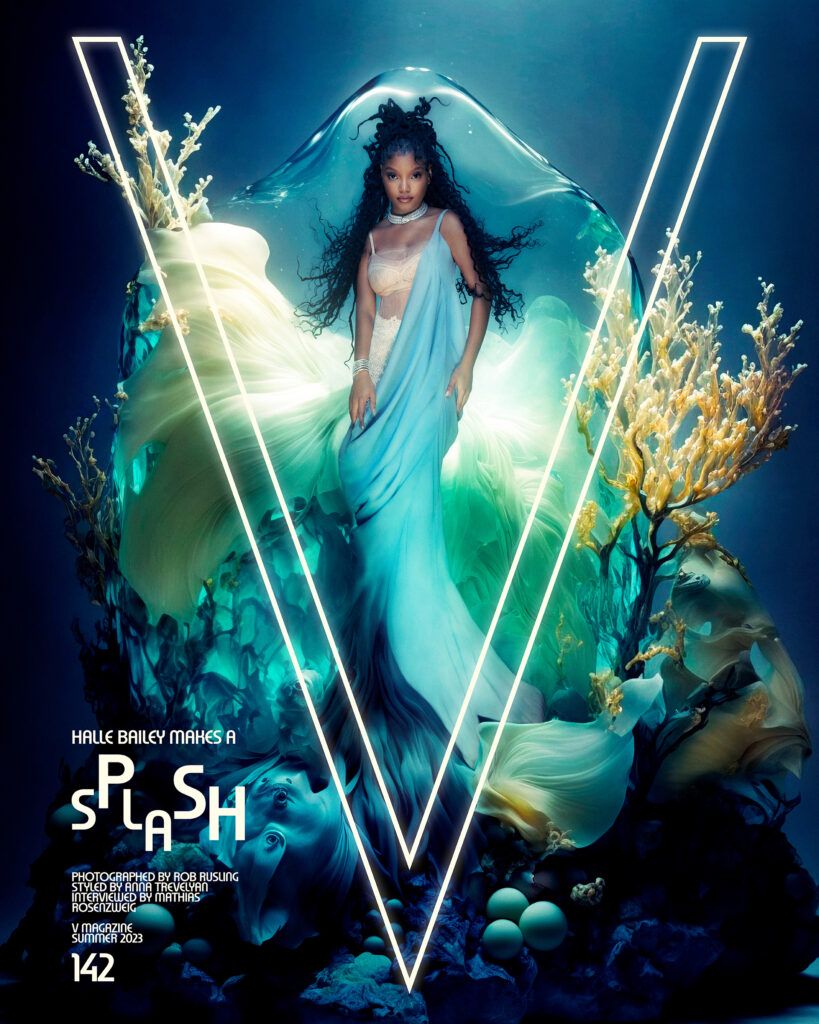
Halle wears dress FENDI HAUTE COUTURE / High jewelry Serpenti necklace BULGARI (in white gold with emeralds and pavé-set diamonds) / High jewelry Serpenti bracelet BULGARI (in white gold set with pavé-set diamonds)
But in training for this role, Bailey’s life began to closely mirror that of her titular character, who was born a mermaid but wished to live as a human (a narrative closely tied to those of queer people, which is unsurprising considering the original writer Hans Christian Anderson’s believed homosexuality). As her identity from musician to feature film movie star took shape, this idea of embracing change and living as who you really are took hold of Bailey, bridging her and Ariel in ways that made for a life-changing performance.
Ahead of the film’s release, V spoke with the soon-to-be household name about her journey from Grammy-nominated artist to a mythical creature who was destined for more.
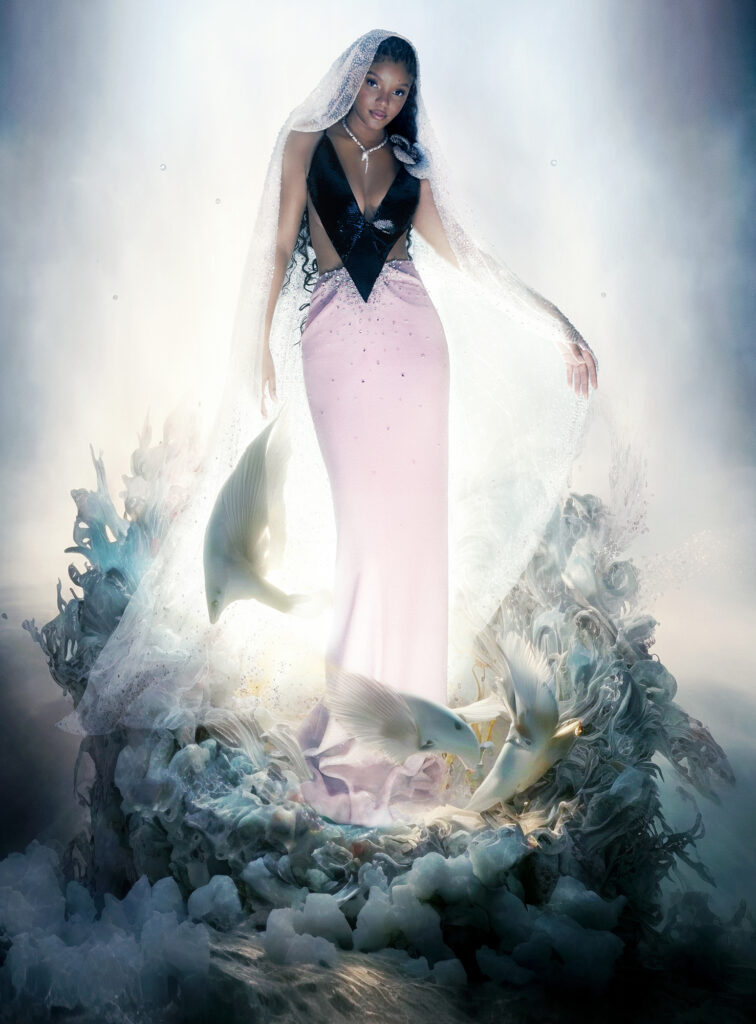
Halle wears dress ARMANI PRIVÉ / High jewelry Serpenti necklace BULGARI (in pink gold with emeralds and pavé-set diamonds) / Veil MISS SOHEE HAUTE COUTURE
V MAGAZINE: Starting from the beginning, what was the audition process like?
HALLE BAILEY: This is kind of the first big film where I play a lead in that has ever come onto my radar. You know, I always tell people I consider myself a singer and musician first, and that all of this happening is a beautiful blessing and opening something new within me. But I got the call to audition for the film when I was 18, and the director of the film, Rob Marshall, had actually seen my sister and I’s Grammy performance where we performed “Where Is the Love” by Donny Hath- away. He saw me in that performance and said I should audition for Ariel. And so when I heard about it, I was so excited to audition and immediately got so nervous because I’d never done anything like this before. I went to the first audition in New York, and they were very warm and very kind to me. They asked me if I wanted to sing or act first, and I was like, “I’ll just sing first because I feel I can get all the nerves out.” So I just remember singing and closing my eyes, and then when I opened my eyes, everyone was crying. And at first, I was like, “Oh, no! Did I do something bad?” And then I quickly realized that it was good. So from there, I had two more auditions and then a screen test and then months passed and I completely forgot about it. I thought, well that ship sailed. And then I got a call saying that I got the role a few months later.
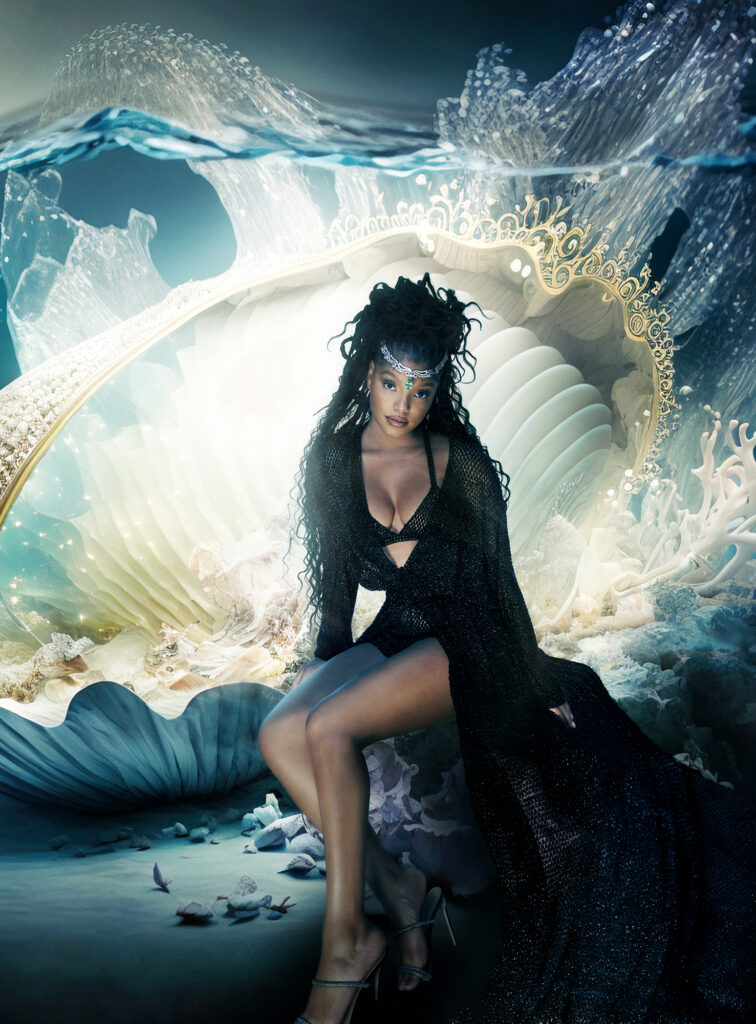
Halle wears dress and bra DIOR HAUTE COUTURE / High jewelry necklace (worn as headpiece) BULGARI (in white gold with tourmaline and pavé-set diamonds) / Shoes GIANVITO ROSSI
V: I happen to be a gay man and know that there are a lot of queer metaphors in the movie. Ariel is a human but wants to live as a mermaid, and her father is there telling her not to. Whether someone is queer or not, it has to do with identity. It’s funny to think that even by filming, you changed your identity from being mostly a musician to a bonafide movie star.
HB: You’re absolutely right. I mean, even in the original that Hans Christian Andersen wrote–he was a gay man and wrote the story based on feeling like he didn’t belong. It’s a beautiful way that the story is told through Ariel’s perspective, because we all can relate to that feeling of, “I know there’s something greater for me.” And for me, I found that a lot of my time in London was that I was feeling the exact way Ariel was feeling in the beginning of the story. It was my first time away from home, I grew up in a very big family. I am the baby of three girls and I have a baby brother. I lived in my parents’ home up until two years ago, and so I grew up always having people around, especially my siblings to guide me. My sister Chloe, who’s like a second mom to me, has always been there in my personal life and my career, holding my hand and guiding me through every step of life. So this was the first project that I did by myself. When I found out I was cast, it was this shock of suddenly finding out that I’d have to move to London–and then the pandemic happened. So suddenly I found myself in London isolated by myself, the borders were closed, the world was shut down, and my family couldn’t even come visit me.
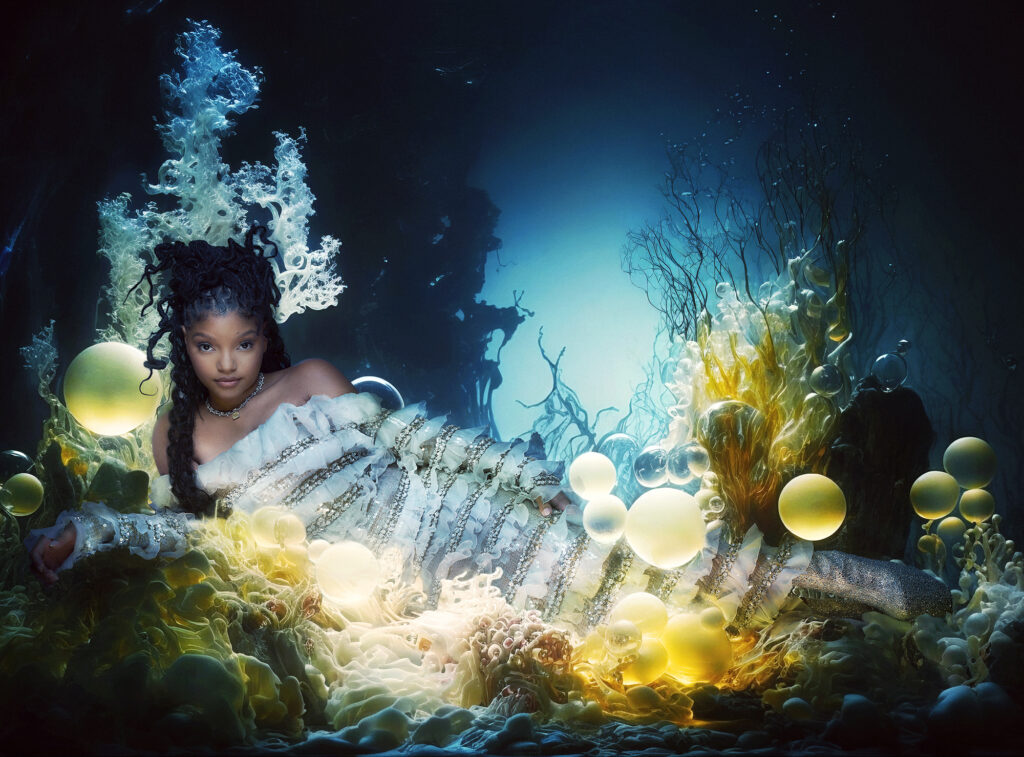
Halle wears Dress VALENTINO HAUTE COUTURE / High jewelry necklace BULGARI (in platinum with emerald cut diamond and pavé-set diamonds)
I felt like I was thrown into a whole other world, and it was really cool because it almost helped me method-wise, to match what Ariel was going through because I literally felt so isolated. I was not suffocated in a bad way, but there was almost just that feeling of, “Here I am in this new place, everything is unknown and I wanna be somewhere else.” So it was really exciting to take that experience and apply it to what Ariel was feeling. And I was glad that it was happening that way because it was almost like somebody showing me exactly how she felt and what she was going through, because I was going through it as well. I honestly can say wholeheartedly that when I first started filming, I don’t think I knew my strength completely as an individual, as a young woman venturing out on her own, because I never got to do the college experience.
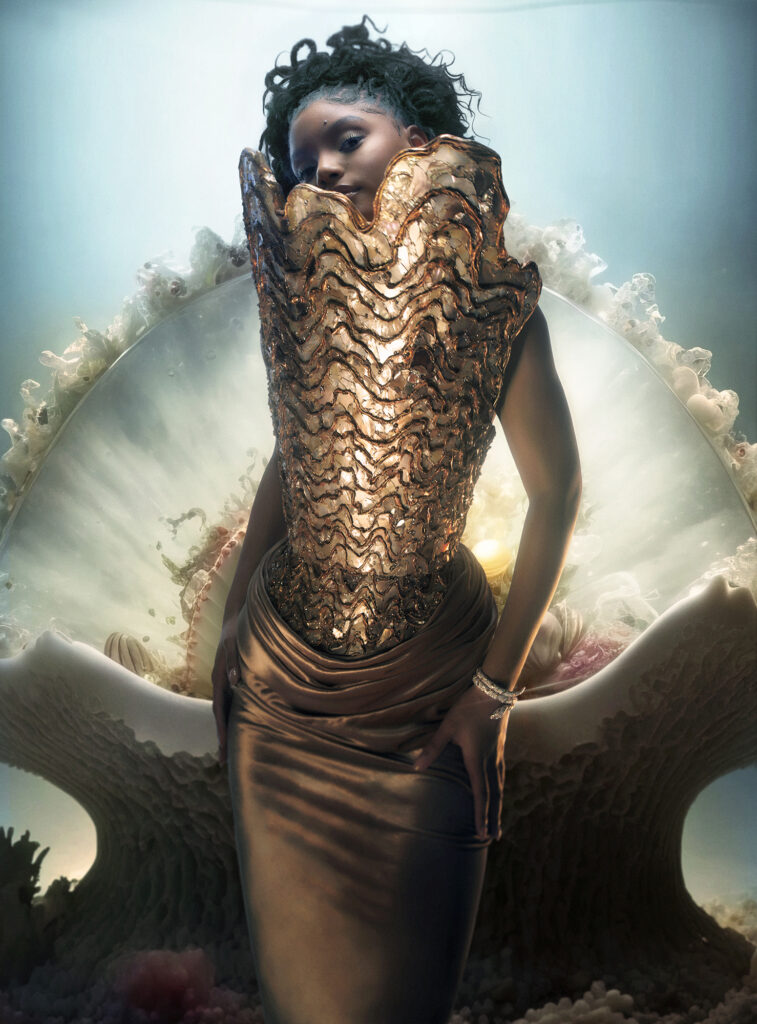
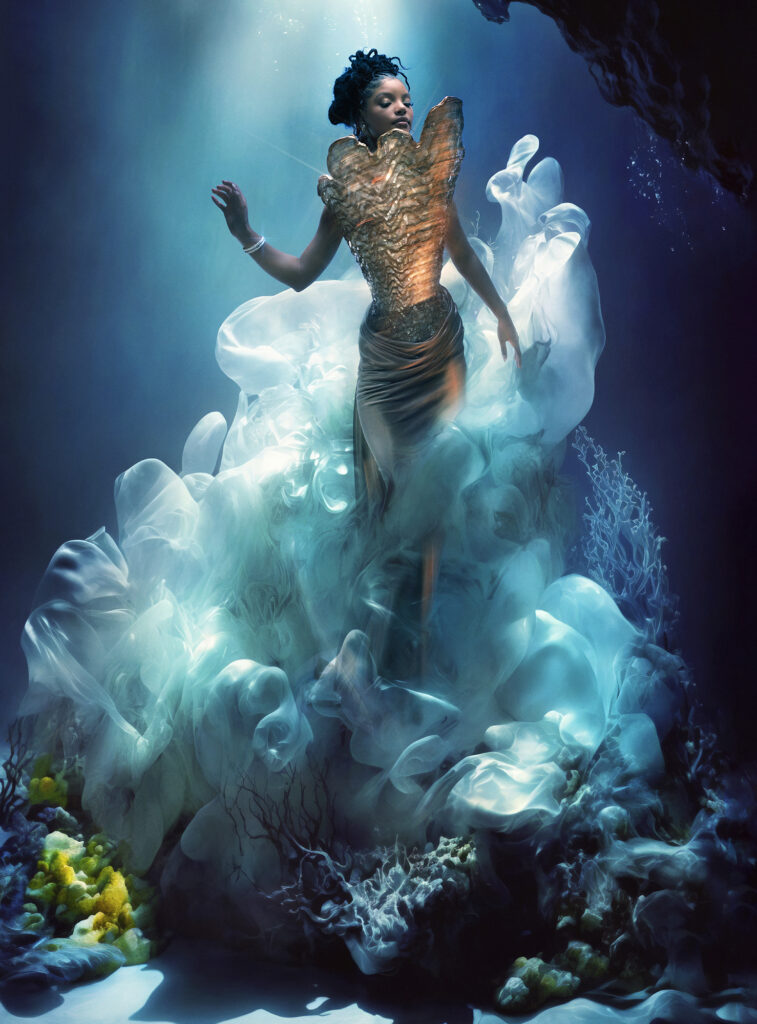
I was on tour since I was 15–I skipped the regular school life. I was homeschooled and per- formed around the world all my life, so that was all I knew. I was always surrounded by people to hold me, to carry me, my sister in particular. So, without that, I felt stripped bare and I had to find that strength within myself. But, I believed in myself and that there was something greater for me—something greater on the other side of fear and the unknown. I remember at the end of filming, I felt like a completely different person. Even watching the little teaser and trailers come out, I look at them and I’m like, “Wow, do I know her anymore?” Like to me, that’s a different girl, you know?
V: Do you feel that the movie has good lessons for both kids and adults? That can even be sort of the same lesson because I think a lot of adults need to be reminded of lessons they maybe learned when they were a kid, but do you feel like it appeals to both of those audiences?
HB: Absolutely. I think the message of this film is universal and there are so many lessons to be learned. The main thing I took away from the filming process was allowing myself the power to go after what I want and not be afraid to do so. For me, that was one of the big lessons, especially when I was filming. I felt like I learned because suddenly I’m on this set and everyone was looking at me and I’d never understood what number one on the call sheet means. Suddenly I’m thrown into this world and I’m like, “How do I navigate? How do I speak up?” And then I remember the first two months of filming, I would slowly come out of my shell.
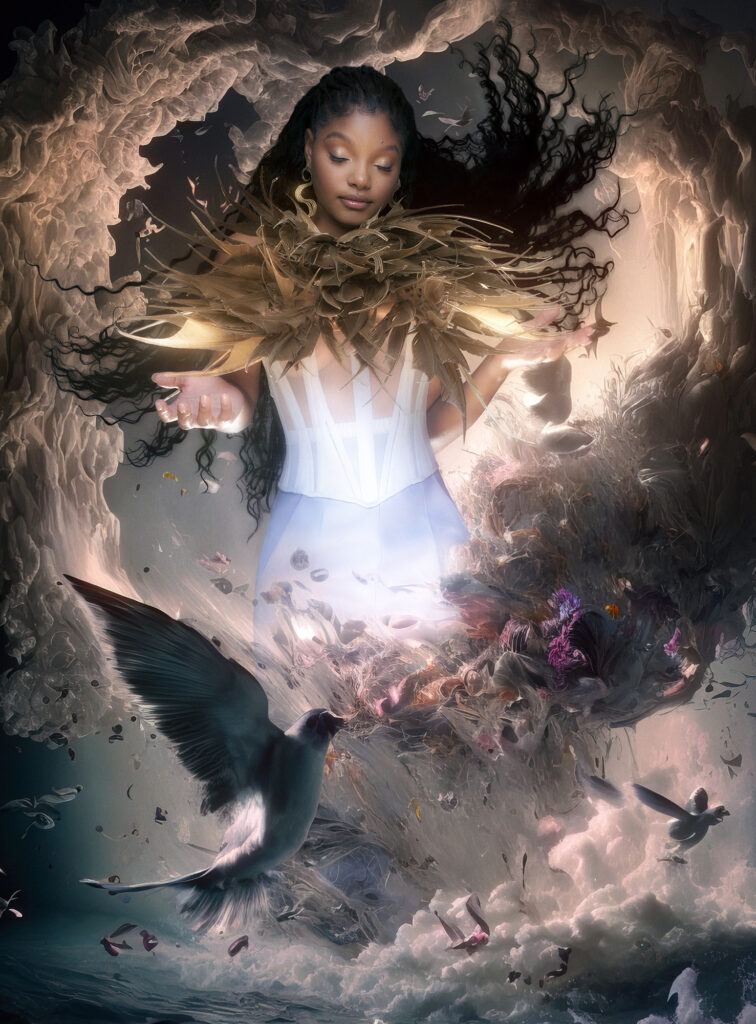
Dress JEAN PAUL GAULTIER HAUTE COUTURE / Earrings L’ENCHANTEUR
And then Melissa McCarthy came to join me on set and it was so cool to witness her work. First of all, she’s such a wonderful human being. She’s so naturally funny, but she’s also just such a boss–she knows her shit! She was just so commanding–her and Javier [Bardem]–she was not afraid to speak up. I just remember looking at her and being like, “You can do that, too!” I just had this epiphany moment, and slowly started coming out of my own shell. I started owning my power and knowing that I, as a woman, have that is a really beautiful thing. And I remember seeing that from her.
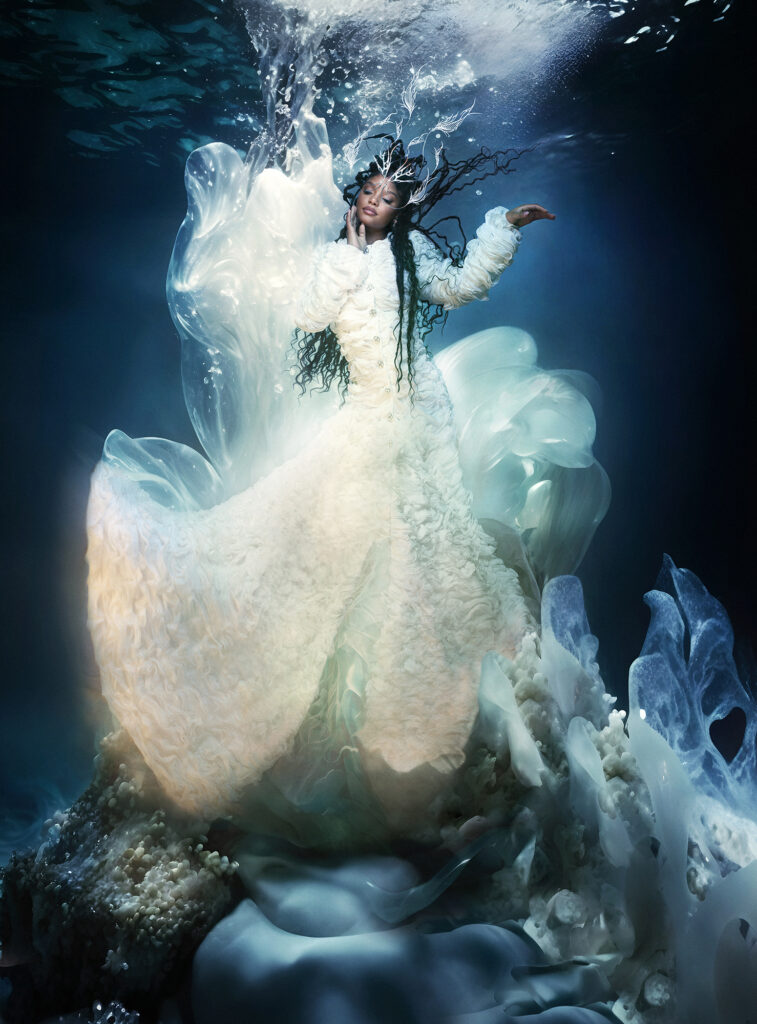
Dress CHANEL HAUTE COUTURE / High jewelry necklace BULGARI (in platinum with pavé-set diamonds) / High jewelry Serpenti earrings BULGARI (in white gold with brilliant cut and pavé-set diamonds) / Headpiece LANCE VICTOR MOORE
Then also there was the physical exercise of me not having any dialogue for half of the film, where I was just acting with my facial expressions. Half the film, I don’t have a voice, so that really taught me a lot about patience. But then also how important it is when you have your voice and what to do with it. So I feel like there were all these little nuggets [of knowledge] that I got out of it, but it really was about the development of who I can be, who I see for myself, and what I see for my future as a young woman. I think the message of the film is universal–go after your dreams and your passions. Especially when you feel like there’s something greater for you, go after it.
This story appears in our V142 Summer 2023 Issue, now available for purchase!
Photography Rob Rusling
Fashion Anna Trevelyan
Interview Mathias Rosenzweig
Editor-In-Chief / Creative Direction Stephen Gan
Makeup Christiana Cassell (The Wall Group)
Hair Tinisha Meeks
Manicure Thuy Nguyen (A-Frame)
Set design Olivia Giles (Jones Mgmt)
Executive producer Johnny Pascucci (Photobomb) / Senior producer Sara Bielecki (Photobomb) / Production coordinator Merry Nestor (Photobomb)
AI artist Nik Gundersen
Photo assistants Kurt Mangum, Brandon Pavan, Brian Kendall
Stylist assistants Niambi Moore, Katie Chavez, Antonina Getmanova
Production assistant Juanes Montoya
Location JK Media
Discover More
